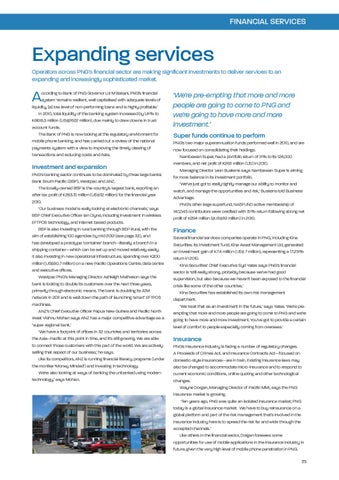Financial Services
Expanding services Operators across PNG’s financial sector are making significant investments to deliver services to an expanding and increasingly sophisticated market.
A
ccording to Bank of PNG Governor Loi M Bakani, PNG’s financial system ‘remains resilient, well capitalised with adequate levels of liquidity, [a] low level of non-performing loans and is highly profitable.’ In 2010, total liquidity of the banking system increased by 1.4% to K6618.3 million (US$2622 million), due mainly to draw downs in trust account funds. The Bank of PNG is now looking at the regulatory environment for mobile phone banking, and has carried out a review of the national payments system with a view to improving the timely clearing of transactions and reducing costs and risks.
Investment and expansion PNG’s banking sector continues to be dominated by three large banks: Bank South Pacific (BSP), Westpac and ANZ. The locally-owned BSP is the country’s largest bank, reporting an after tax profit of K283.15 million (US$112 million) for the financial year 2010. ‘Our business model is really looking at electronic channels,’ says BSP Chief Executive Officer Ian Clyne, including investment in wireless EFTPOS technology, and internet based products. BSP is also investing in rural banking through BSP Rural, with the aim of establishing 100 agencies by mid 2012 (see page 33), and has developed a prototype ‘container’ branch—literally a branch in a shipping container—which can be set up and moved relatively easily. It also investing in new operational infrastructure, spending over K200 million (US$80.7 million) on a new Pacific Operations Centre, data centre and executive offices. Westpac PNG’s Managing Director Ashleigh Matheson says the bank is looking to double its customers over the next three years, primarily through electronic means. The bank is doubling its ATM network in 2011 and is well down the path of launching ‘smart’ EFTPOS machines. ANZ’s Chief Executive Officer Papua New Guinea and Pacific North West Vishnu Mohan says ANZ has a major competitive advantage as a ‘super-regional bank.’ ‘We have a footprint of offices in 32 countries and territories across the Asia–Pacific at this point in time, and it's still growing. We are able to connect those customers with this part of the world. We are actively selling that aspect of our business,’ he says. Like its competitors, ANZ is running financial literacy programs (under the moniker ‘Money Minded’) and investing in technology. We’re also looking at ways of banking the unbanked using modern technology,’ says Mohan.
‘We’re pre-empting that more and more people are going to come to PNG and we’re going to have more and more investment.’ Super funds continue to perform PNG’s two major superannuation funds performed well in 2010, and are now focused on consolidating their holdings. Nambawan Super, had a portfolio return of 11% to its 124,000 members, and net profit of K263 million (US) in 2010. Managing Director Leon Buskens says Nambawan Super is aiming for more balance in its investment portfolio. ‘We’ve just got to really tightly manage our ability to monitor and watch, and manage the opportunities and risk,’ Buskens told Business Advantage. PNG’s other large superfund, NASFUND active membership of 140,545 contributors were credited with 15% return following strong net profit of K294 million ($US$119 million) in 2010.
Finance Several financial services companies operate in PNG, including Kina Securities. Its investment fund, Kina Asset Management Ltd, generated an investment gain of K7.4 million (US$ 7 million), representing a 17.25% return in 2010. Kina Securities’ Chief Executive Syd Yates says PNG’s financial sector is ‘still really strong, probably because we’ve had good supervision, but also because we haven’t been exposed to the financial crisis like some of the other countries.’ Kina Securities has established its own risk management department. ‘We treat that as an investment in the future,’ says Yates. ‘We’re preempting that more and more people are going to come to PNG and we’re going to have more and more investment. You’ve got to provide a certain level of comfort to people especially coming from overseas.’
Insurance PNG’s insurance industry is facing a number of regulatory changes. A Proceeds of Crimes Act, and Insurance Contracts Act—focused on domestic-style insurances—are in train. Existing insurance laws may also be changed to accommodate micro-insurance and to respond to current economic conditions, online quoting and other technological changes. Wayne Dorgan, Managing Director of Pacific MMI, says the PNG insurance market is growing. ‘Ten years ago, PNG was quite an isolated insurance market; PNG today is a global insurance market. We have to buy reinsurance on a global platform and part of the risk management that’s involved in the insurance industry here is to spread the risk far and wide through the accepted channels.’ Like others in the financial sector, Dorgan foresees some opportunities for use of mobile applications in the insurance industry in future, given the very high level of mobile phone penetration in PNG.
35
